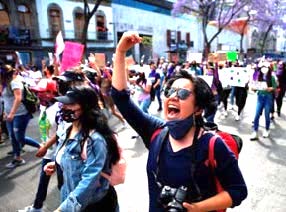Abolish Private Property: Communism Will Be the True “Beloved Community”
“What is the ‘beloved community’?” A few church members discussed how a community could truly welcome everyone, however “difficult” they might be. And to recognize that every one of us might be “difficult” to someone else.
One question was, “What are the obstacles to creating a beloved community?” I had just read the Red Flag International Women’s Day article, so I offered that a huge obstacle is capitalism. I summarized the article. Others were intrigued and related it back to the church, not exactly the direction I’d intended.
This excellent article covered a lot of ground and couldn’t go into detail about everything. I think some things need clarification.
A gendered division of labor existed even before the earliest class societies. Its material basis was the biology of reproduction, though women were (if anything) more respected for their ability to bear and nurse children. Communities valued the work of all genders.
As the article explained, in many agricultural societies, members of more than two generations lived and worked together. Such a family “was an economic unit of production, reproduction and consumption.”
This is important because many of us were taught that “the family” consists of a husband, a wife and their children, and that anything else is substandard or unnatural. As the article said, imagining communism requires much more expansive thinking.
But even before capitalism, many working people were separated from the means of production and forced to work to support a propertied ruling class. Ancient Mesopotamia and Egypt, China, Greece and Rome all relied on slave labor. The forms varied, but most slaves were not part of their own family unit.
The agricultural societies referred to in the article are (or were) class societies. The rise of class society institutionalized a qualitative change for the worse in the status of women. Within village family units, men were often considered the owners of their wives and children. Their mothers might treat the wife (or wives) as servants or worse.
In some societies, the gendered division of labor extended into women’s councils with real power. Elsewhere—especially under the ideological cover of Confucianism or monotheism—women in oppressed families were doubly oppressed.
This is why it’s so important, as the article says, that “we are building a communist future, not trying to replicate the past.”
What will our households look like? What work will we do in (and as) a household, and what work will take us out of our households? Will party collectives be based on households, other workplaces, neighborhoods (or villages), or a combination? How can we make communism be the “beloved community” that my church friends want?
Will the answers be the same everywhere, or differ by region? And how will we knit these collectives together into a party in which everyone works for the greater good of all, everywhere?
Our practice today – especially the work of building party collectives – must enable all of us to start thinking about these questions and more.
Church-going Red

MEXICO CITY, March 8—Thousands of women across Mexico took to the streets on International Women’s Day despite the pandemic and the history of repression of these demonstrations. They made their anger and shock visible in a country where eleven women are killed each day.
Protests targeted President Andrés Manuel López Obrador, who has proved himself incapable of addressing women’s problems. His supporters within the fragmented feminist movement can’t force him to comply with the demands of organized women. Nor has any opposition group been able to catalyze the anger of millions of women who face daily the sexist oppression generated by capitalism. Communism must become the alternative.

